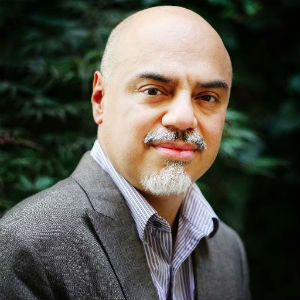Times Journalist Salutes Rare, Unforgettable Moments
By Neil Earle
 Hector Tobar
Hector TobarSometimes you hear a talk you wish C-SPAN could have relayed across the country.
This happened for me a couple of years ago at the Unity and Peace Concert at the Duarte Performing Arts Center. In light of the tensions trying to upset our community – gang incidents with a racial twist – Los Angeles Times columnist Hector Tobar went out of his way to remind us of his article recalling “the long African American struggle for civil rights.” This historic happening, he wrote, “has blossomed into an oak tree of justice whose large canopy protects all of us, no matter our color.”
Black History Month we can stand to hear his talk again.
Well put. This is a point almost criminally neglected today. A copy of this column was handed out at this special evening event sponsored by the Route 66 Parade Committee. Tobar went on to state: “Let’s start with the basic fact of our citizenship. Like thousands of other Angelenos, I am the son of immigrants. I thus owe my citizenship to Dred Scott, a slave who sued for his freedom in 1857, and to people like Frederick Douglass, who took up his cause.”
The Supreme Court’s infamous Dred Scott decision of 1857 argued that blacks had no recognizeable rights as citizens under the U.S. Constitution even if born in this country. This was just before the Civil War when many were trying to appease the Deep South and the solid Southern voting bloc in the U.S. Congress almost held a stranglehold on the issue of slavery. Yet less than eight years later and 630,000 dead in the great crusade to end slavery which it eventually became (1861-1865), a Republican Congress passed the Fourteenth Amendment granting citizenship to everyone born in America. “These days,” says Tobar, “the children of Mexicans and Central Americans are the chief beneficiaries.”
Nor is this just high school history.
In Tobar’s reading the “dead and battered of 1960s Birmingham and Selma, Alabama” were Latino martyrs as well. “Their sacrifice made the civil and voting rights we now enjoy possible.” Just a month before his death, the non-violent advocate Dr. Martin Luther King, Jr. wired Caesar Chavez words that fit each and every occasion: “As brothers in the fight for equality, I extend the hand of fellowship and goodwill.”
Controlling the Narrative
Though the twists of time and unfortunate history have tattered and frayed these cords of unity, the early 1960s are not a bad place to visit ever so often. It is good to have the Tobars reminding us of how the narrative of the 1960s includes more than “acid and anarchy.” For a time there was a shining moment of hope and unity that bore real fruit, perhaps the kind of moment the Unity and Peace organizers were trying to recapture on July 11. Too often in modern historical reconstructions people judge the whole experience of the 1960s through the lens of Watts in 1965 and Detroit in 1966, as if the civil rights marchers somehow caused these tragedies. Too often things get blended and blurred in a sludgy soup of incomplete collective memories. Televised images constantly repeated too easily can skate over the complexities involved.
But there are historians who see it differently. Tobar the journalist is one of them. He knows that photographs also exist of black seamstresses and Boston bluebloods being arrested together and of a marching MLK flanked by Greek Orthodox bishops and Presbyterian elders and Jewish rabbis. The riots of the late 1960s were often a result of a dream too long deferred, of social changes being blocked and thwarted in spite of the Voting Rights Act of 1964 and the Civil Rights a sludgy soup Act of 1965.
Tobar reminded us of that moment in time, when freedom seemed indivisible, and of other moments such as his personally witnessed, largely peaceful “browning of South Central.” “I was once in the same boat they are,” a 70-year-old black resident told Tobar on assignment for the Times in 1992. “I don’t mistreat them because I didn’t want to be mistreated.” There’s an old saying that a Lie travels five times around the world before the Truth can get its boots on. That’s why we need the Tobars to challenge the popular narratives of our time, erroneous and as incomplete and as deadly as they sometimes are. In Duarte, public-spirited people and civic leaders are rallying to beat back the threats to our unidad, communidad, famila. In this light, the Peace and Unity organizers deserve credit for walking in the spirit expressed in the unforgettable cadences of Dr. King: “This is not a victory for black Americans. This is a victory for all Americans. Injustice anywhere is a threat to justice everywhere.”
And yes, we shall overcome.
(Neil Earle is host of DCTV’s A Second Look program and an adjunct professor of American History at Citrus College.)